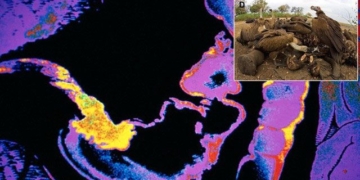Seafood is gaining popularity for its delicious and nutritious dishes, as well as its role in functional foods that help treat certain diseases. However, seafood is also a category of food that can easily cause allergies or food poisoning. Therefore, it is important to take precautions against allergies and poisoning from seafood.
Why has seafood become a “specialty”?
 |
|
Fried shrimp (Image: thaifoodcatering.com) |
Scientific studies agree on the nutritional value and disease prevention properties of various seafood types, such as:
– Anti-thrombosis due to omega-3 fatty acids that produce anti-platelet agents.
– Lowering blood triglyceride levels, reducing the risk of heart attack.
– Improving endothelial function and enhancing vasodilation.
– Reducing atherosclerosis…
Thus, fats from seafood, especially from ocean fish, are considered beneficial for the heart and brain. It is believed that if a woman consumes ocean fish regularly during the first three months of pregnancy, her child will have better brain development than others.
Moreover, men often admire seafood dishes like clams, snails, live fish with mustard, fish cooked in tomato broth, and grilled fish wrapped in foil, as they are a source of zinc. Just 2-3 clams can provide the necessary daily zinc intake. According to research from the Nijmegen University (Netherlands), which monitored 108 men with normal fertility and 103 with infertility, sperm density was found to be low. In cases of infertility, those receiving a nutritional supplement containing both folic acid and zinc showed a 74% increase in sperm density and a slight increase (4%) in abnormal sperm.
The Struggles of Allergic Individuals
 |
|
(Image: themenupage.com) |
Seafood dishes, from tuna to sun-dried squid, are favorites for many, but they can pose concerns for those with allergic tendencies. Seafood ranks among the top 20 foods that commonly cause allergies, especially in children (accounting for 12.5%). When accidentally consumed, allergy symptoms due to histamine release in the body often occur, such as:
– Itching, hives, runny nose, itchy and red eyes.
– Low blood pressure due to dilated capillaries, asthma, difficulty breathing due to bronchial constriction, gastrointestinal smooth muscle stimulation leading to cramps and vomiting.
– Severe allergic reactions can potentially lead to death. Additionally, food poisoning from consuming pufferfish or unfamiliar sea snails can also result in fatal outcomes.
Common seafood allergens include shrimp, crabs, clams, snails, and tuna… Some individuals may be allergic to these foods while being fine with others. Furthermore, pregnant women should limit their intake of tuna due to its potential mercury content, which can be harmful to the fetus.
What to Do If You Experience an Allergy?
If you eat an unfamiliar dish and experience an allergy, it’s important to pay attention to the following:
Eliminate the Allergen
This is the primary measure to prevent worsening allergic reactions. If someone knows they are allergic to squid, it is best to avoid eating squid and any dishes prepared with it. Cooking foods that are likely to cause allergies can help reduce their allergenic effects.
Take Antihistamines
Eliminating the allergen addresses the root cause, while using antihistamines treats the symptoms caused by histamine release in the body. Traditional antihistamines are less commonly used today due to their shorter duration of effectiveness and tendency to cause drowsiness. Newer antihistamines cause less drowsiness and can provide relief for 12-24 hours with a single dose. These include Cetirizine, Terfenadine, Loratadine, Tritoqualine, and Fexofenadine…
Therefore, those who are allergic to one type of seafood may be able to try other seafood dishes in small amounts to check for allergic reactions. If no reaction occurs, they can continue to enjoy seafood without completely eliminating it, which would take away the joy of culinary experiences in daily life.


















































